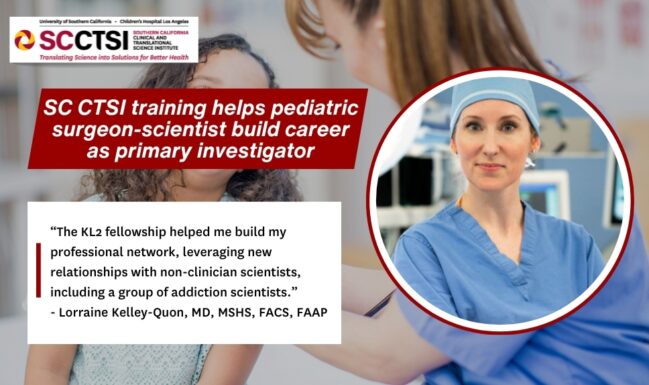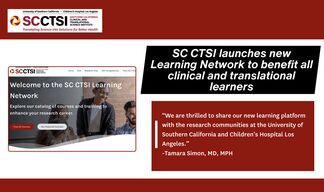SC CTSI training helps pediatric surgeon-scientist build career as primary investigator
SC CTSI is a clearinghouse for research resources, mentorship and invaluable guidance
Caregivers and clinicians seek to manage children’s pain after surgery as effectively and safely as possible. But what are the risks and benefits of prescription opioids in managing post-surgical pain, and can alternatives be as effective as opioids?
To help answer those questions, Lorraine Kelley-Quon, MD, MSHS, FACS, FAAP, is leading a study of adolescents and young adults 12 to 20 years of age who have undergone tonsil removal, gallbladder removal or arthroscopic knee surgery.
The CARES for Kids study (Comparing Analgesic Regimen Effectiveness and Safety After Surgery for Kids) will be the first prospective, randomized, controlled trial comparing opioid and non-opioid pain medication following common surgical procedures in adolescents and young adults. Dr. Kelley-Quon is Co-PI for this clinical trial along with Dr. Mark Bicket at the University of Michigan. This clinical trial is funded by a $7 million contract with the Patient-Centered Outcomes Research Institute (PCORI).
“The trial is designed to learn what happens when opioids are prescribed for adolescents and young adults undergoing surgery, and we think it will be the gold standard,” said Kelley-Quon, a pediatric surgeon at Children’s Hospital Los Angeles (CHLA) and Associate Professor of Surgery at the Keck School of Medicine at the University of Southern California.
“This the first trial of its kind to enroll such a large cohort from four different centers,” said Kelley-Quon, who operates on children of all ages ranging from premature infants to teenagers.

Kelley-Quon is a past recipient of the KL2 Mentored Career Development award
from the Southern California Clinical and Translational Science Institute (SC CTSI), and she credits this team-based research training as an important factor in enabling her to guide this project.
The study will recruit 900 participants over three years, with data collection expected to finish in four years. Participating patients will be randomly assigned on the day of surgery to receive an NSAID, acetaminophen, or a regimen including a low-dose opioid.
“There is a broad distribution of practice across the U.S., and we want to understand when opioids are appropriate for children and what are the benefits versus side effects of different strategies,” Kelley-Quon added. “When participants receive prescriptions after surgery, we will have electronic medical record data to track.”
Participants will be surveyed on a mobile device up to one year after surgery to answer questions about short- and long-term pain, insomnia and medication side effects such as constipation and prolonged opioid use or misuse. Study results could help clinicians understand which approach to managing pain is best to recommend to teens and young adults who have surgery.
Experience and contacts gained in SC CTSI’s KL2 program laid the foundation for Kelley-Quon’s development as a research scientist. The program provides protected research time for clinicians and enables scholars to conduct multidisciplinary projects, focuses on designing, conducting and analyzing clinical studies in a team-based setting.
During her KL2 fellowship, Kelley-Quon completed a study of postoperative opioid use in adolescents. The results identified predictors of postoperative use, safe disposal, and chronic use.
“Dr. Kelley-Quon’s research and progress is an excellent example of work in the translational paradigm and the key characteristics of a translational scientist,” said Elizabeth Burner, MD, PhD, Director of the SC CTSI Mentored Career Development-KL2 program. “She committed herself to developing her analytic skills, but also strong team science skills. Her work highlights needed policy and clinical guideline changes to improve the health and care of diverse populations.”
Throughout the program, Kelley-Quon expanded her collaborations.
“The KL2 fellowship helped me build my professional network, leveraging new relationships with non-clinician scientists, including a group of addiction scientists,” she said. “I wrote multiple papers using a methodology I hadn’t used before, adding to my research toolkit.”
She also received two SC CTSI team science awards. The first award allowed her to create a multidisciplinary group of experts to review scientific publications on opioid usage and risk in pediatric surgical populations. The review resulted in a November 2020 article published in JAMA Surgery and its findings were endorsed by the American Pediatric Surgical Association.
For the second team science award, she and her colleagues recruited focus groups of adolescents aged 13-20 years old who had received a postoperative opioid prescription, as well as their caregivers and families.
“These were focus groups of people I had already enrolled in my KL2 project, and I asked them about their experience receiving opioids after surgery,” Kelley-Quon said. “I was very impressed with how much accurate information families and teenagers had. They were very well-read on opioids and the opioid epidemic, and families just wanted extra safety information. When you give the right information to them, they'll use it appropriately.”
The focus groups generated qualitative data that allowed Kelley-Quon and her team to publish several research articles.
“We had quotes from focus groups about what was meaningful to adolescents and their caregivers and their parents in post-operative opioid use,” said Kelley-Quon.
These focus group quotes and published articles provided the backbone for her research proposal to PCORI, the leading funder of patient-centered comparative clinical effectiveness research in the U.S.
Kelley-Quon credits SC CTSI awards for helping design her career as a primary investigator.
“SC CTSI is a clearinghouse for research resources, mentorship, and help with grant applications,” said Kelley-Quon. “You can search for collaborators or early career and team science awards. It provides a wonderful opportunity to get some early successes and funding you can leverage for later, larger projects.”
Now, Kelley-Quon is a mentor in the KL2 program, helping the next cohort of clinician-scientists develop their skills.
“I’ve benefited from having great mentors, and now in the KL2 program, I'm learning more about how to be a good mentor to others,” said Kelley-Quon.
One of her mentees is a current KL2 scholar – Atu Agawu, MD, MPH, MS, is a gastroenterologist and assistant professor in the Department of Pediatrics at the Keck School of Medicine of USC and Children's Hospital Los Angeles.
Agawu appreciates his mentor’s advice in managing his progress in the KL2 program.
“She’s been very helpful from a guidance perspective,” Agawu said. “Even though we are in different disciplines, we're both clinicians and we're both doing research, and she’s been through the KL2 program. She has a structural understanding of the program, so she can forecast how I need to manage my schedule and other challenges.”



